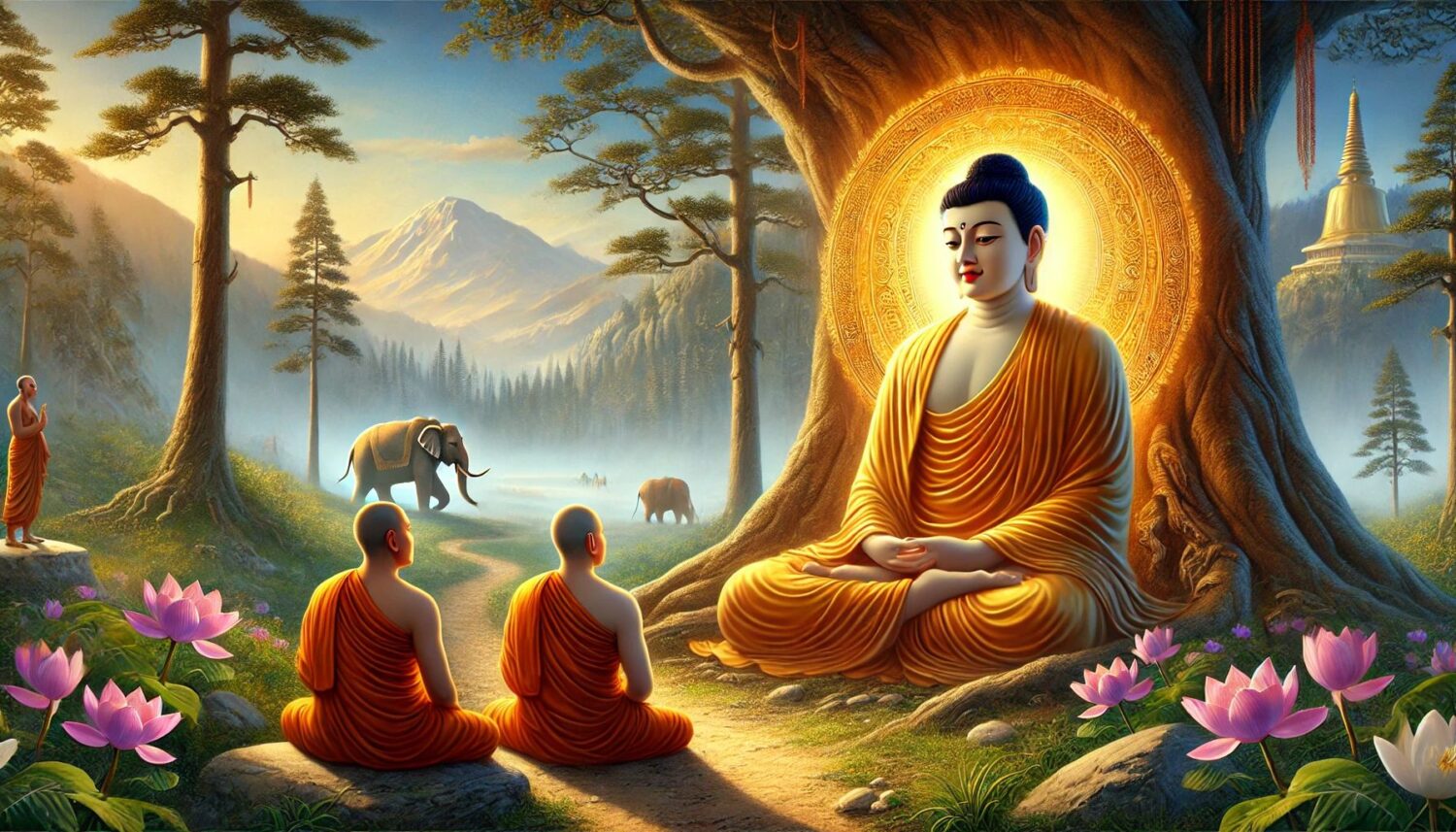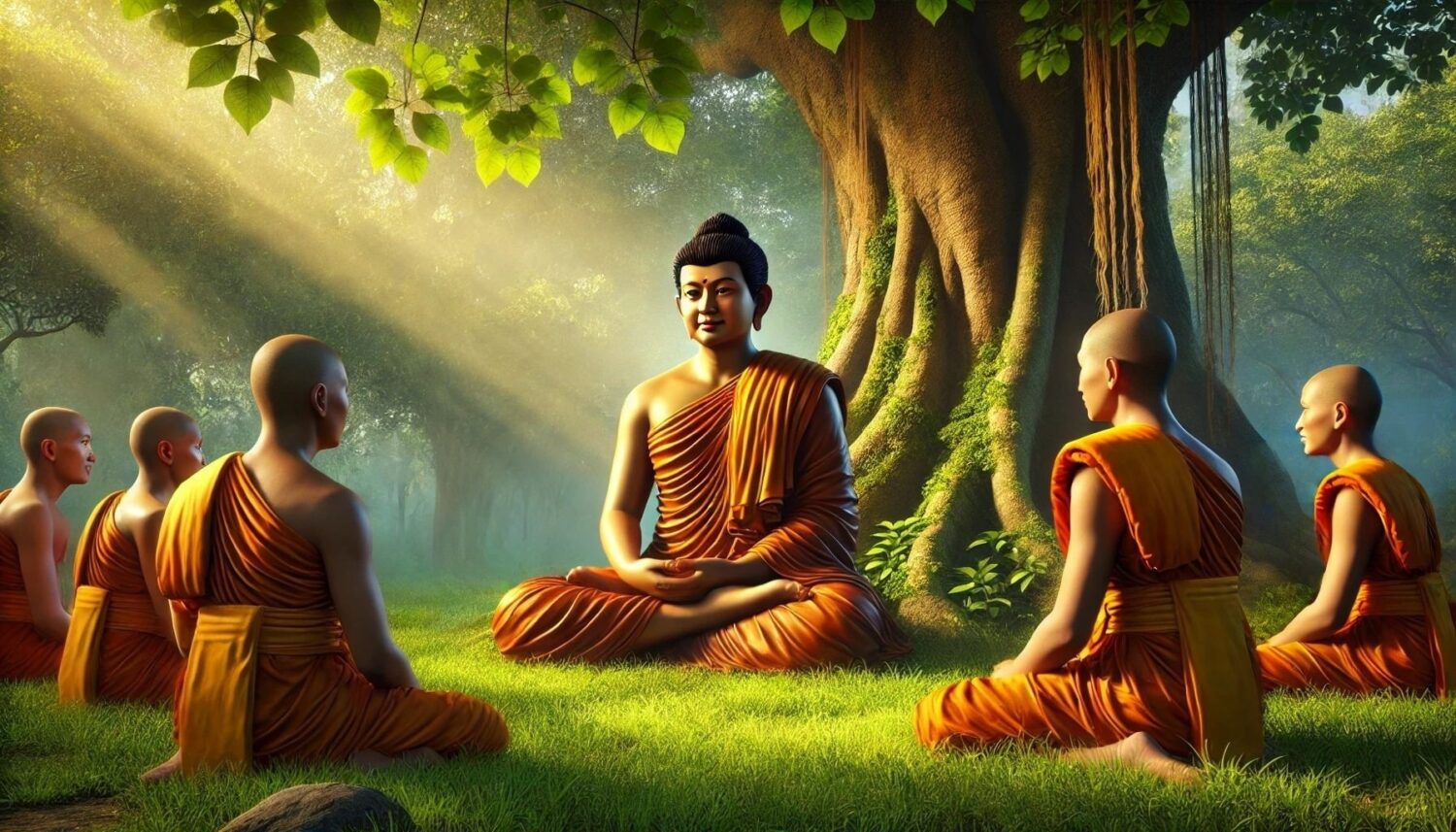
Date: 02/22/2025 02/23/2025
Location: Star Lake Meditation Center
Teacher: Shilin Long
Dharma Talk
The Rescue of Lady Tiwei by a Monk
Long ago, in the kingdom of Paishanja, there lived a Brahmin woman named Tiwei. Although she was born into a wealthy family, she had become a widow at an early age. With no parents above her and no children to rely on, she lived a lonely life, filled with sadness and sorrow.
At that time, there was a custom among the Brahmins: if someone found their life filled with endless misfortunes and suffering, they could perform a great almsgiving ceremony by offering food to one hundred Brahmins. Then, they would donate all their wealth to five hundred Brahmins.
Finally, they would go to the Ganges River, build a wooden pyre, lie upon it, and set it aflame, burning their body to ashes. The Brahmins would then offer blessings, believing that by doing so, all past sins would be extinguished. In their future rebirths, they would be surrounded by many loving relatives, enjoy limitless lifespan, and live in eternal happiness.
One day, a group of elder Brahmins gathered to discuss this practice and happily set off to Tiwei’s residence to inform her of this “path to liberation.”
After listening to their explanation, Tiwei, reflecting on the suffering and misfortune in her life, longed to escape from it as soon as possible. She agreed to follow their instructions. Without hesitation, she ordered her servants to gather firewood from the mountains and calculate all the wealth in her household.
News of her decision quickly spread across the kingdom of Paishanja, and soon, people in every street and alley were discussing the event.
At that time, a Buddhist monk named Bhaddipā happened to be passing through the kingdom. Bhaddipā was a monk of great virtue, known for his strict discipline, vast knowledge, and eloquent wisdom. He traveled the land, teaching with great compassion, guiding people away from evil and towards goodness, and helping them attain the true benefits of the Dharma.
When he overheard the discussions among the people, his heart was filled with compassion. Without delay, he hurried to Tiwei’s home.
Upon arriving, he asked, “Lady, why have you gathered so much firewood?”
Tiwei replied, “I intend to burn this unfortunate body of mine to eliminate my past sins and sufferings!”
Hearing this, Bhaddipā gently advised,
”Sins are not erased simply by destroying the body. One’s fortune and misfortune arise from the mind itself. What you are about to do is like a sick person, already in great pain, being approached by a wicked man who insults and then slaps them. Tell me, how would such a patient react?”
Tiwei thought for a moment and replied, “Their anger and suffering would surely multiply a thousandfold!”
Bhaddipā nodded and continued,
”Precisely! Lady, you must understand—when the raging flames engulf your body, your breath will not yet have ceased, and your consciousness will not yet have departed. At that moment, both your body and mind will be tortured by fire. How could such agony possibly lead to liberation?
Worse still, at the moment of death, overwhelmed by extreme pain, you may give rise to great hatred, which will cause you to fall into the hell realms. There, the suffering will be a million times worse than anything you have known! Once you lose this precious human body, you may never regain it for countless eons. Escaping from the torments of hell will be nearly impossible—how, then, could you ever hope for true liberation?”
Upon hearing Bhaddipā’s words, Tiwei’s mind suddenly became clear. Her desire to end her life instantly vanished, and she humbly asked the monk to teach her the true path to eradicating sin.
Bhaddipā then instructed her:
”The evil of past thoughts is like clouds obscuring the moon.
The goodness of future thoughts is like a torch dispelling darkness.
All sin arises from the actions of the body, speech, and mind.
Now, sincerely repent with deep devotion.
From this day forth, resolve to abandon evil and cultivate virtue.
Uphold the Ten Virtuous Deeds,
And in lifetime after lifetime,
You shall walk steadily toward the attainment of Buddhahood.”
After speaking, Bhaddipā formally bestowed upon Tiwei the Ten Virtuous Precepts.
Filled with immense joy and gratitude, Tiwei immediately prepared a great offering of fine food and precious treasures, hoping to repay the monk and persuade him to remain and continue teaching.
However, Bhaddipā gently declined, saying,
”Lady, having accepted the Ten Virtuous Precepts, you are now a disciple of the Three Jewels. Your best way of repaying me is to teach others the Ten Virtuous Deeds, so that they too may benefit.
Now that you have awakened to the right path, you have already been saved. But many others still need guidance. I cannot stay here any longer, for my duty is to continue helping those who are still lost in suffering.”
After saying this, Bhaddipā departed, taking nothing with him.
From that day on, Tiwei wholeheartedly followed the Dharma, never doubting Bhaddipā’s teachings. She diligently practiced, devotedly upheld the Three Jewels, and generously gave to others. Through various skillful means, she inspired those around her to follow the Ten Virtuous Deeds. The people she helped continued to spread the teachings, ensuring that the righteous Dharma flourished.
Tiwei deeply understood that it was the Three Jewels that had given her a new life and led her to find the true path of light. Her faith in the Three Jewels remained unshakable.
At the end of her life, she was reborn in the heavenly realms, where she enjoyed boundless blessings as a celestial being.

